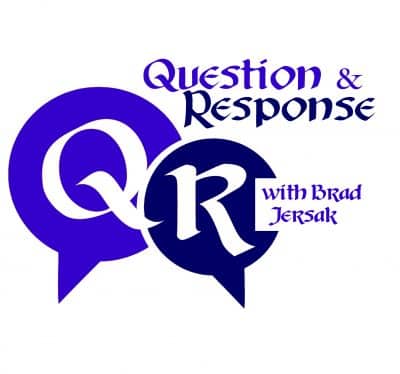Q&R with Brad Jersak – Sin
Question:
I have just finished reading “Out of the Embers,” and you know, I never once thought about sin (at least “sin” as understood in my evangelical context).
Does sin (moral or ethical infraction) mean anything to you anymore? To God?
Response:
Great question! In our modern and post-modern context, the word “sin” often carries a lot of baggage and not nearly enough depth.
For example, in the tradition I was formed in, “sin” generally referred to:
- 1. The “sin condition” I was born with, inherited from Adam’s guilt… we called this “the sin nature” and were taught that when we came to Christ, we would receive a “new nature” or “new heart.” There was debate about whether the “sin nature” remained or had been eradicated, but somehow, we had this sense that something was still fundamentally not right in us. And that meant Jesus “covered the sin with his righteousness,” but as Luther or one of his disciples said, we are now “snow-covered dung,” and thus, still rotten to the core.
- 2. “Sins,” on the other hand, described all the ways we had missed the mark of perfection and fell short of the glory of God. We needed to be aware that we had all sinned, and that the wages of sin is death, but we were also taught that God in Christ has forgiven us… OR will forgive us as we confess our sins. While I affirm the Scriptures that make these statements, what came out in the preaching (especially from revivalists), seemed to be an obsession with sin that led to a kind of moralism and tormented striving that drove the problem deeper.
In reaction to this, many authors and teachers who have had a “grace awakening” seem to be allergic to using the word “sin” or worse, they may even deny there is such thing as sin or a sin problem. And for those who were crushed under the weight of a counterfeit gospel of moralism (which I describe in A More Christlike Way), even using the word properly shuts them down. So what are we to do? My solution is to use some alternative terms that describe the gravity and depths of the sin problem in terms of its exact nature and weigh heavily to God’s responses. Like so:
- 1. Rather than “sin,” I use the language of “self-will,” “alienation,” and “darkness.” Self-will is the exact nature of sin, as described in the story of the Garden of Eden. By self-will, we became self-centered and selfish. That’s sin. But it is clearer to people if I call it egoism (the enthronement of the ego). And egoism is not just bad behavior. It is spiritual bondage.
- 2. That bondage to self-will or egoism leads us to a state of alienation and a trajectory toward death (which Jesus calls “perishing”). While God never separates himself from the “sinner,” we alienate ourselves from him. We turn from the Light and Life and Love of God. That alienation is also the “sin condition.” And it requires a Savior who is the living Message of God’s radical forgiveness, redemption and reconciliation. With as much as we say about forgiveness, people can infer that there was a sin problem, but by calling it alienation, they can own it much more easily instead of getting defensive.
- 3. I mention the analogy of darkness a lot, too. Turning from the Light to the darkness generates a shadow of darkness, that includes every evil we perpetrate or suffer. And this, too, is sin. But again, much worse than doing a bad deed. It includes incredible self-deception and delusion, including spiritual blindness and moral darkness. That’s sin. But again, “sin” as we used to use it seems too shallow… bad fruit that can’t be just lopped off. We need to take the axe to the roots of the tree (the roots being self-will and the axe being surrender).
- 4. This surrender, of course, is repentance, but that word has degenerated into a kind of fleeting regret and self-loathing that does not ultimately transform us. But if we say, it’s time to surrender our lives to the care of God, to turn to the Light of the good news of Jesus Christ, and return home to God the Father, those who do so are actually repenting instead of rehearsing their cycle of internal beatings.
- 5. In my view, these four points take the sin condition much more seriously and the take call to deal with it to a much deeper level. But what of “sins.” The above helps us to have a clearer idea of what sins are. They are not merely breaking an external rule that God established. To keep the rules that way through abstinence doesn’t get to the heart of the matter. Following Jesus’ teaching, we say that “sins” are specifically any violation of the great commandment and its partner–when we fail to love God or fail to love our neighbor as ourselves, that covers every sin (according to Jesus). Thus, we sin regularly, whether in knowledge or in ignorance, by acts of commission or omission. But in every case, it is a violation of love and, as best I can tell, does harm (to myself, to another person, to my community, or to creation.
- 6. These are sins, but when I call them sins, it sounds these days like both an (a) accusation based on a law I’ve identified, and (b) a violation of a rule rather than of love itself. So instead of harping on the term sins, I bring the problem to the table using synonyms that describe our participation in sin’s essential properties: how have I turned from love today? where did I fail to turn toward love? How have my thoughts, words, or actions caused harm today, to myself or to another? Where do I need to do an about-face, make a move toward love, and make right the harms I’ve done?
So in my recent book, Out of the Embers, I think you’ll see all of this kind of language permeating the book. In that sense, I have a LOT to say about sin, but I try to say it in a way that the truth will be heard and the invitation received. Thanks for the insightful and important question!
P.S. Despite the mistakes of a few Bible translations, Scripture does not describe a “sin nature.” We all share in one “human nature.” And that human nature includes temptations, passions, cravings, and desires. When these rule us, we call that “living according to the flesh,” but when we keep in step with the Spirit, we call that “living according to the Spirit.” So again, to which impulse are we orienting ourselves at any given moment?
best,
Bradley












 Plain Truth Ministries | Box 300 | Pasadena, CA 91129-0300
Plain Truth Ministries | Box 300 | Pasadena, CA 91129-0300

